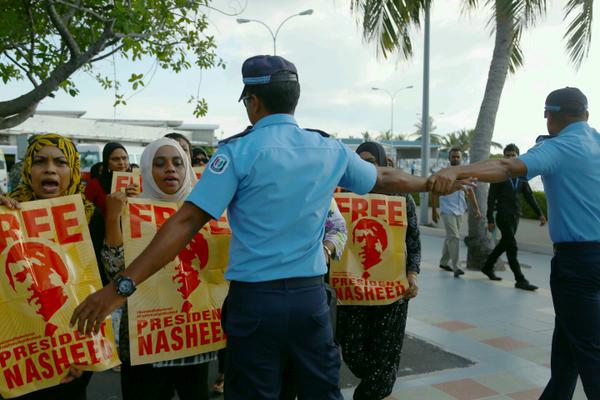
Amnesty International has raised serious concerns over the fairness of former President Nasheed’s trial, calling it a “selective approach to justice”.
In a statement released on 3 March, Amnesty International said:
“The arrest of former president Mohamed Nasheed, and his apparent mistreatment in custody and lack of fair trial, highlight a selective approach to justice in the Maldives.
“Amnesty International urges the Government of Maldives to ensure the due process of law, and that any judicial processes against Mohamed Nasheed conform to international fair trial standards.
“There should be an independent and impartial investigation into Mohamed Nasheed’s treatment in custody, with anyone responsible for ill-treatment being brought to justice, and into why the judge did not allow him to receive medical treatment.”
The next hearing of President Nasheed’s trial will be held at 8pm local time on Thursday 5 March at the Criminal Court in Male’.
Since President Nasheed was arrested on 22 February, Male’ has been rocked by nightly protests, causing traffic gridlock and stand-offs with riot police.
Last Friday saw some 10,000 people march through the capital, calling for Nasheed’s release and an end to the politically motivated arrests and harassment of opposition figures.
Yesterday, female protesters picketed the President’s Office demanding Nasheed’s release. Today, a number of female MDP protesters were arrested while calling for President Nasheed’s release at Male’s Ibrahim Nasir International Airport.
The opposition Maldivian Democratic Party (MDP) has vowed to continue protesting until President Nasheed is released from jail.
The MDP is planning another major protest in Male’ on Friday 6 March.
Background information
President Nasheed is the Maldives’ first democratically-elected president. He was elected into office in 2008, bringing to an end the 30-year dictatorship of Maumoon Abdul Gayoom.
In February 2012, President Nasheed was ousted in a coup, after mutinying police and army personnel overrun the institutions of state.
In the first round of presidential elections in 2013, President Nasheed received 45% of the vote to Yameen’s 25%. But the Supreme Court constantly meddled in the election – repeatedly annulling, cancelling and postponing the ballot in order to favour the candidacy of Yameen, Gayoom’s half-brother, who went on to assume the presidency.
On January 24 2015, Gasim Ibrahim, who polled third in the first round of the 2013 elections with 24% of the vote, and his party the JP, quit Yameen’s coalition government and sided with President Nasheed and his party, the MDP.
In quitting the governing coalition, Gasim cited President Yameen’s continued attempts to undermine the rule of law and institutions of democracy, including the sacking and harassment of members of the Elections Commission.
In recent weeks, President Yameen’s allies in parliament announced plans to put an upper age limit for those running for President, which would bar Gasim from competing in the 2018 presidential elections.
On February 10 2015, Yameen’s Defense Minister, Colonel (Ret.) Mohamed Nazim, was arrested following a power struggle within government. He has been taken to Dhoonidhoo Detention Centre and faces charges of treason.
ENDS